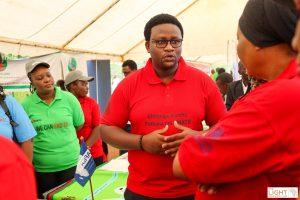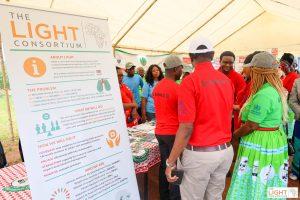By Luke Banda

This year’s World TB Day, under the theme “Yes! We can end TB!”, provides a moment for us to reflect on the optimism and hope we carry with us in our efforts to end the global tuberculosis epidemic. In Malawi, the engagement of the Leaving no-one behInd: Transforming Gendered pathways to Health for TB (LIGHT) research programme highlights how meaningful collaboration with partners and stakeholders, anchored on this hope and optimism, is essential to ending TB in the country. This was witnessed at a recent stakeholder workshop convened by LIGHT on 16–17 March 2023 in Malawi’s Dowa district.
LIGHT is coordinated by a consortium of international and national health research and policy organisations working to end TB in endemic countries of Kenya, Malawi, Nigeria, and Uganda. The programme’s work is drawn from the trend showing that two out of every three cases of TB which go undiagnosed or undetected are in men. Gender-sensitive pathways and approaches to health can stop the spread of TB. Malawi Liverpool Wellcome Programme (MLW) and the African Institute for Development Policy (AFIDEP) lead LIGHT’s engagements in Malawi. Central to LIGHT’s work in the country is an emphasis on the collective efforts of TB partners guided by a very clear goal and co-created vision.
The Gender and TB workshop that was held in Dowa saw the coming together of officers from the Ministry of Health & Population and Ministry of Gender, Community Development & Social Welfare; District Health Officers; civil society representatives from Partners in Health and FACT Malawi; and other TB partners who convened through the LIGHT Consortium with an end goal of co-creating gender-sensitive approaches to end TB in Malawi. Data from Malawi’s National Tuberculosis and Leprosy Elimination Programme (NTLEP) reveals that men (males 15 years or older) have more TB than women. In 2021, for instance, men accounted for 57% of TB cases in the country, with this attributed to biological and sociocultural factors that make men more susceptible to the disease and delay seeking treatment when symptoms appear. This contributes to the spread of TB in Malawi, and the number of TB deaths.
Since 2020 when LIGHT began work in Malawi, the Consortium has worked very closely with the government ministries alongside other key TB partners. Understanding the work and the priorities for each TB partner informs what each partner is capable of contributing towards ending TB. Through existing structures such as the Technical Working Groups (TWGs) of which LIGHT is a member, the Consortium has participated in important meetings, consequently revealing opportunities for a synergistic gender and TB approach towards ending TB. Our efforts in Malawi are driven by our values of collaboration and partnership, and this inspired the co-creation of this Gender and TB partnership. Events leading up to the workshop, interactive sessions during the two days, and feedback post event have given a clear understanding of the opportunities that exist for collaboration guided by a co-created roadmap that has been developed to govern this partnership.

The two-day interactive Gender and TB workshop premised its discussions on the theme “Opportunities for Cross-learning Gender-sensitive Approaches on TB”. The first day of the workshop was dedicated to group discussions and interactive sessions on gender and TB. The group discussions allowed for participants to identify priority areas for TB based on their daily experiences at work. This particular exercise revealed some gaps in the service delivery of basic TB care thereby prompting the group to discuss the anticipated success of our efforts in Malawi towards ending TB and if we are actually going to end TB by the set global timelines. The World Health Organization (WHO) has set an ambitious target to end the TB epidemic by 2035 – a reduction in the number of patients suffering from TB by 90%; and a reduction in the number of deaths from TB by 95%. The consensus was that Malawi is on the right track to end TB, but the group recognised that the road to end TB is not straight, and so while global timelines may not be met, consistency in our collaborative efforts will yield positive results in due course.
Deliberations and reflections on the second day of the workshop revealed a newly found sense of understanding amongst all members that were present regarding the work that each partner is focusing on, and the opportunities that exist for collaboration, co-creation, and synergy in our efforts to end TB. Through the participatory approach of this workshop, the group was able to create a roadmap, set to govern collaboration in the next programmatic year of LIGHT which will support the work of all partners in Malawi. Feedback from the two-day session suggests that holding this high-level interactive workshop regularly will indeed create a targeted approach towards ending TB through gender-sensitive approaches.
The partners appreciate the value of the stakeholder workshop, including the opportunity to understand one another and co-create a roadmap to guide TB prevention and care efforts in Malawi. We are determined to keep lines of communication open, and keep doors open for collaboration, co-creation and synergy. There is indeed a palpable and lingering optimism among the partners following the workshop, and we join the rest of world on 24 March in acclaiming that “Yes! We can end TB!”.